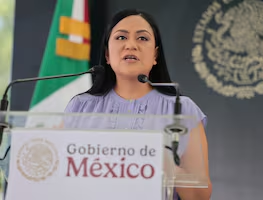Más Información

¿Nos asaremos este año? 2024 rompe récord como el más caluroso; expertos exigen políticas para cambio climático

Caso “Billy” Álvarez: Por mil 300 mdp inició pesquisa contra expresidente de Cruz Azul; estos son los delitos que enfrenta

INE perfila reglas de gastos de campaña de elección judicial; confía en contar con ampliación de recursos

“Billy” Álvarez de dirigir al Cruz Azul y la Cooperativa cementera a ser acusado de lavado de dinero; fue detenido en CDMX
On the frontline of Brazil's fight against Zika, Vandson Holanda sends Roman Catholic volunteers into the poorest areas of this city, showing residents how to protect themselves against mosquitoes that carry the virus linked to birth defects.
Get rid of trash where water accumulates and allows the mosquitoes to lay eggs. Wear plenty of repellant and clothing that covers arms and legs. Close shower drains so the insects cannot find pooled water inside your home.
But there are no lessons offered on methods to avoid getting pregnant, which Brazilian officials and international public health experts have urged women to do until the Zika epidemic is under control.
The crisis is putting pressure on Church doctrine that bans all forms of contraception, and has even stoked a debate over abortion in many conservative Latin American nations.
"I think, and this is my personal opinion, that the Church will have to re-think its position on contraception urgently as a result of Zika," said Holanda, coordinator of the Church's health committee in four northeastern states at the center of the epidemic.
"The current view is not realistic."
On Thursday, Pope Francis appeared to suggest the Church could soften its ban on contraception for women as they face the Zika crisis.
"Avoiding pregnancy is not an absolute evil" Francis told reporters on the papal plane as it returned to Rome following his tour of Mexico.
He said there is a precedent of exceptional dispensations allowing women to use contraception, citing a decades-old case of Pope Paul VI permitting nuns in Africa to use birth control pills because they risked being raped in political conflicts.
The pope did not elaborate further and did not indicate if the faithful who want to avoid pregnancies amid a Zika epidemic would have the Church's explicit blessing to do so or if priests at the local level would just look the other way, at least until the Zika situation becomes clearer.
Francis did make clear there would be no change to the Church's position on abortion. "It is a crime. It is an absolute evil."
Much remains unknown about Zika, including whether it actually causes microcephaly, a condition marked by abnormally small head size that often results in neurological and developmental problems. Brazil is investigating the potential link between Zika and nearly 4,500 suspected cases of microcephaly.
Researchers have identified evidence of Zika infection in most of 508 confirmed microcephaly cases, either in the baby or in the mother, the health ministry said Wednesday, but have not confirmed that Zika was the cause.
Ahead of Francis' visit to Mexico, a senior Vatican official said he did not expect any change to the Church's position on birth control and Catholic scholars also said it was unlikely.
"I find it quite amazing that there has been so much attention given to contraception, birth control and abortion legislation regarding Zika, when I think much more attention should be given to the source of the Zika problem, which are mosquitoes," said Father Robert Gahl, professor of ethics at the Pontifical Holy Cross University in Rome.
In cases of Zika infection, the Church's focus would be on providing a woman with the best health care possible to either avoid being infected in the first place or to care for a child with birth defects, along with pushing abstinence, he said.






